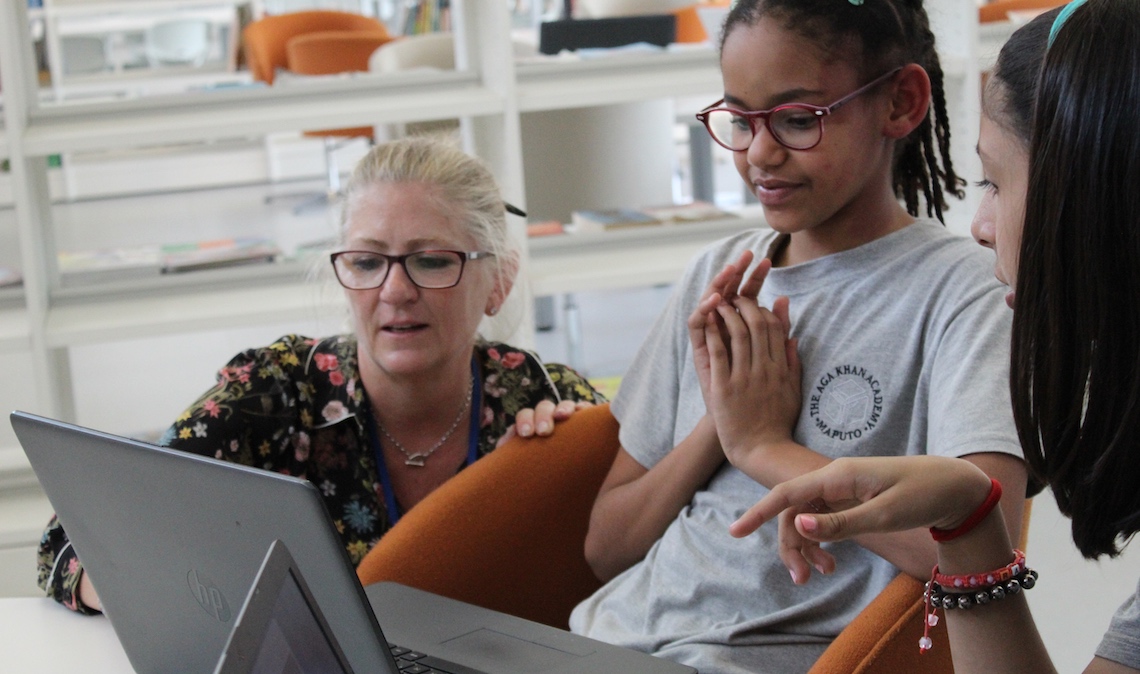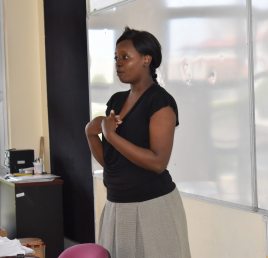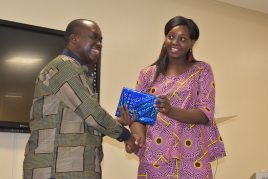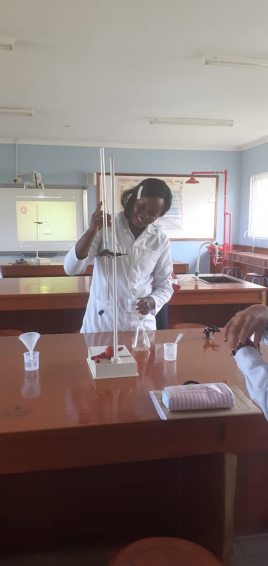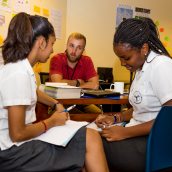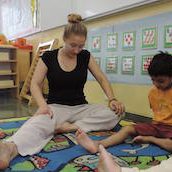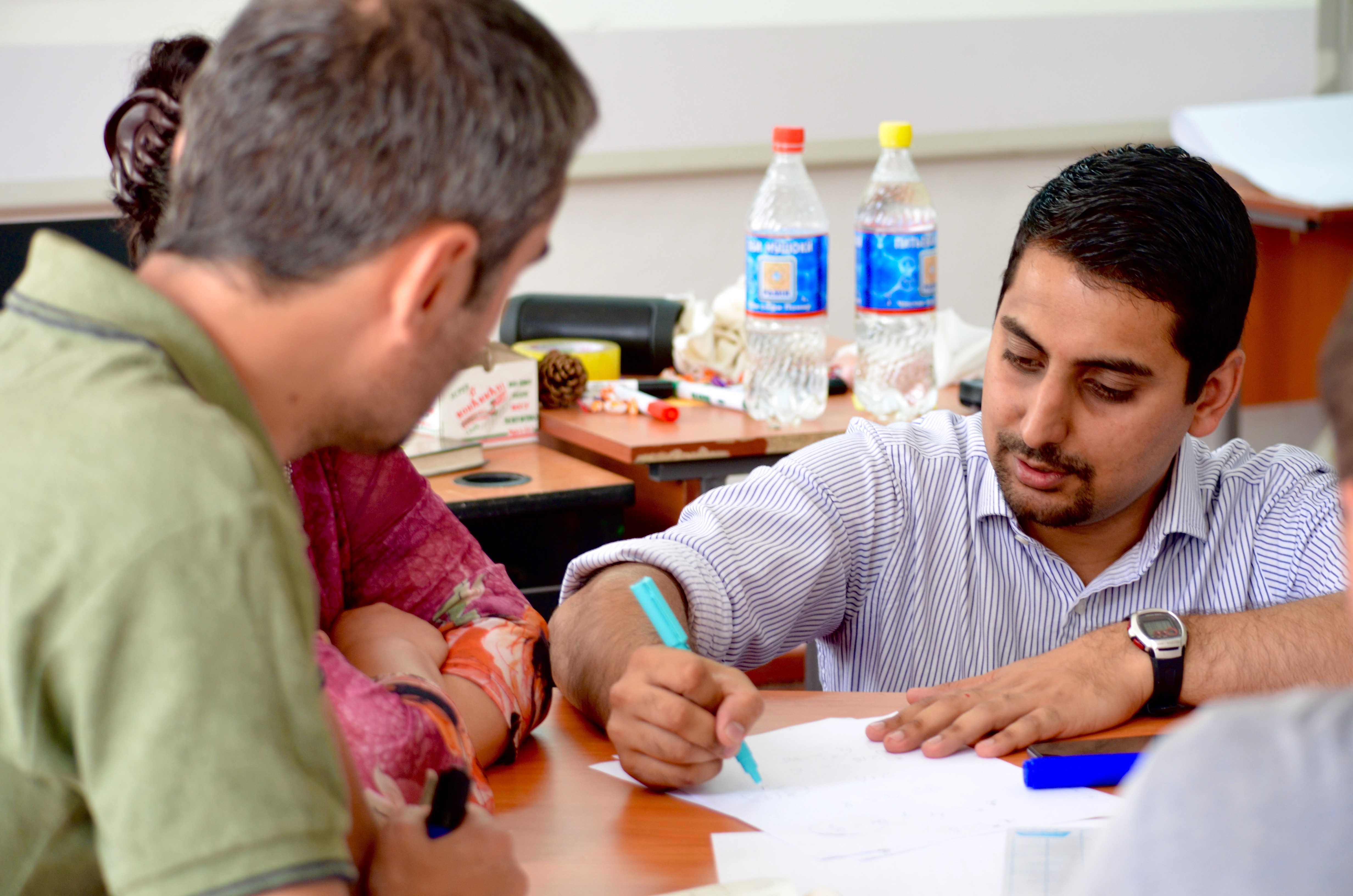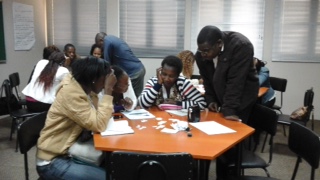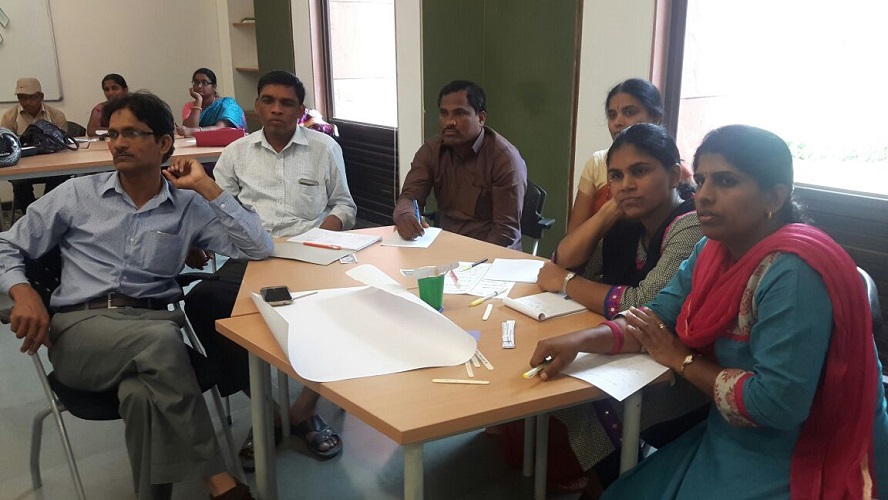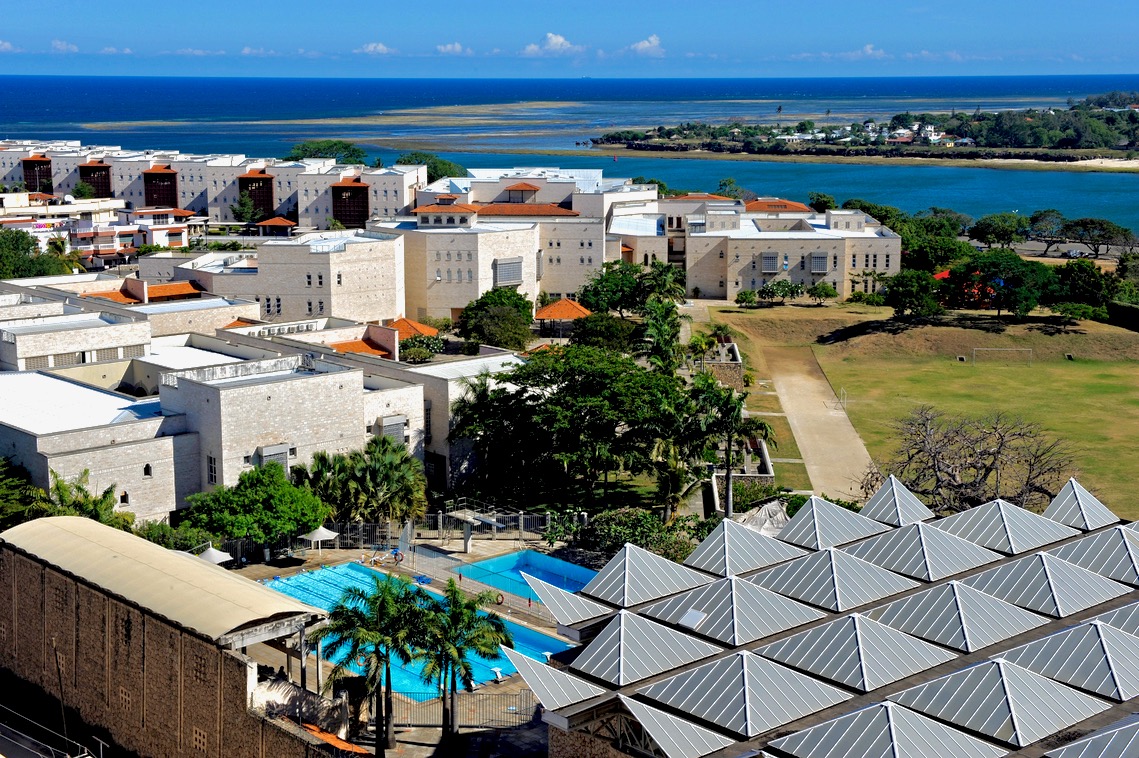Tanya Lalani, a Diploma Programme 2 student, speaks to Bhaavik Blessed Mamidala about her fond memories at the Aga Khan Academy Hyderabad o
Rebecca Nichols: Seeing Endless Possibilities for the Future of AKA Maputo
Engaging Students to Become Stake-Holders in the Future of the Academy
For the Middle Years Programme (MYP) Coordinator, Rebecca Nichols, the sky is the limit when envisaging the future of the Aga Khan Academy in Maputo, Mozambique. More importantly, in her eyes, how the Academy keeps growing, shaping and expanding its role in the country and beyond must lie in the hands of students.
“I would like to see our students take responsibility for what our school should become,” she states with excitement, squarely placing the emphasis on student-centred leadership. “I look forward to hearing their ideas for new initiatives, and I look forward to AKA Maputo becoming a school on the African continent from which leaders emerge,” she adds with resolute clarity.
Listening to the details of Rebecca’s background, education, and experience is highly entrancing. Born in the United Kingdom, she spent the early years of her life in Kenya before moving to the Ashanti Goldfields in Ghana for a few years and then back to Great Britain where she obtained her university-level education.
Armed with Master’s Degree in Education from the University of Bath and a post-graduate certificate in Education from the University of Sheffield, Rebecca has taught schools in Portugal, Angola, Kenya, Sweden, Spain, Italy and Hong Kong. In addition, she has worked as an International Baccalaureate (IB) Diploma examiner, an MYP workshop leader and an independent educational consultant for schools in various parts of the world. She is currently pursuing a Doctorate Degree in Education. A British citizen, Rebecca says of her background, I think of myself as a transcultural, rather than someone who identifies particularly with the UK.”
The Academy’s IB Programme is rich in Curricular Strands of ethics, pluralism, economics for development, cultures, governance, and civil society. These play a vital role in Rebecca’s teaching as she incorporates them in her instruction.
“I teach English language and literature and am always able to explore texts and language through the lens of the IB Programme’s Curricular strands,” she notes. “Currently, some of my grade 6 and grade 7 students and are studying Shakespeare’s ‘The Tempest,” and we have explored the themes of governance and civil society in the play.”
Mutual respect and mutual trust between students and also between students and teachers are of paramount value for a thriving classroom. How does Rebecca ensure that this environment exists in her classroom?
“By listening to one another. By supporting one another. By helping one another reach their potential.”
Recognising the importance the Academy attaches to incorporating pluralism and the one-family feeling in the school, Rebecca states of the teachers, “We do a lot of work on team- building activities and also try to engage our students in undertakings that will enable them to develop a sense of community, a sense of family.”
Students, too, participate in this responsibility of developing a sense of belonging. “Our students have set up an after-school programme called “Teen Talks” that enables them to discuss their feelings, experiences and, concerns,” Rebecca says. “Their openness to one another ensures that a climate of pluralism flourishes within the Academy.”
Although Rebecca values her students and works hard to educate them, she feels an excellent education must involve parents. “Any outstanding education must involve three parties; the students, the parents/guardians and the teachers,” Rebecca is quick to note. “I communicate a lot with parents through monthly coffee mornings, emails and events to which parents are invited. I especially look forward to the parent-teacher conferences.”
Radiating ambition for her students to become independent thinkers, even while working in groups, Rebecca designs projects that foster independent thinking skills.
“I create exciting, relevant units of work that expose them to a range of language and literature from a variety of contexts,” she states. I encourage them to be creative, to work independently, in pairs and as part of a group. I provide detailed feedback and expect students to be able to provide meaningful feedback to one another,” she pauses. And then continues, “I encourage them to take risks, to read widely and to learn about the world beyond our campus fences. I encourage them to try things they have never done before.”
Cherishing her time at the Academy, Rebecca feels the experience she is acquiring will continue to resonate with her throughout her life. “Working at the Academy has enabled me to become a more effective multitasker who is willing and able to take on a wide variety of roles that support teaching and learning,” she muses. “I believe that this is an exciting time for the Academy and look forward to being part of the journey.”
Welcome to the Aga Khan Academy, Maputo
Quick links
The Aga Khan Academy Maputo has been awarded IB status by the International Baccalaureate
Multimedia
The Aga Khan Academy Maputo: From Vision to Reality
View all Academies videos
Recent news
Alaina Hirani, a Diploma Programme 2 student, speaks to Bhaavik Blessed Mamidala about how the Aga Khan Academy Hyderabad nurtured the righteous aspirations in her.
Zara Amjad, a Diploma Programme 2 student, speaks to Shritha Sattaru about how the Aga Khan Academy Hyderabad helped her evolve as a confident leader over the past 12 years.
Fiona Makena Kinyua: A transformed educator
“I was elated,” she says. “There were twenty graduates who made it to the final phase. I was one of them. It made me very happy because the TPP programme is very competitive.”
TPP, a multi-phase programme, was designed by the Academies to train outstanding graduates from public universities to teach one or more of the International Baccalaureate Programs (IB) schools. The initial component of the three-part programme, Choosing to Teach Institute was launched in Mombasa in 2013. This was followed by the other two components: Learning to Teach Internship and Teaching to Learn Residency. Today, the Programme is taught in all three academies.
The aim of TPP is to train teachers to become transformative educators in their communities with the vision, as the programme states, “to provide exceptionally talented and highly motivated Academies students with a rigorous academic and leadership-development experience.” The skills the trainees gain from completing any component of the programme are considered highly valuable, thus raising academic standards in the schools in which they teach.
Armed with a Bachelor’s degree in Education Science, Fiona completed the TPP training in June 2019, and currently teaches mathematics and chemistry at the Naisula School, Kajiado County in Kenya. Highly motivated and ambitious for her young students, Fiona says it is her training with TPP that drove her to change her education approach. Her instruction is now entirely student- centered, she states proudly. She has whole-heartedly embraced inquiry-based instruction to engage her students and uses the education concept of differentiation to tailor her lessons to meet individual needs.
Fiona Makena Kinyua with TPP Coordinator Tom Abuto“I thank the TPP fraternity for the opportunity to train as an International Baccalaureate teacher. My teaching methods have changed. I remember initially I had a challenge in facilitating an inquiry-based lesson. I am now happy that I do that with ease. I differentiate and engage students. I now reflect and ask students for feedback. I am open and welcoming to colleagues coming to my classes and giving me feedback.”This capacity-building endevour to improve the quality of education in local schools is clearly stated in the TPP mission statement which reads: “TPP seeks to develop teachers who are talented individuals with high professional expectations and aspirations; are creative and committed to their own life-long learning and self-improvement; and have a strong professional identity grounded in a well-articulated philosophy of teaching.”
The TPP’s curriculum makes a fundamental shift-from a focus on teaching to a focus on learning. It is designed to help teachers internalise the IB education philosophy.
“The TPP story is rich,” states curriculum coordinator, Tom Abuto, radiating pride and ambition for his students. He is quick to emphasise that only the topmost candidates are recruited into the rigorous and competitive full 18-month programme.
Fiona Makena KinyuaTPP is a model for a growing number of educators who believe that the programme is a much-needed engine for social change. The TPP is offered in partnership with University of British Columbia which provides programme quality assurance and external assessment of participants’ work.TPP is also the first school-based programme to be recognised by the IB Educator Certificate in Teaching and Learning and the only such programme on the African continent. In addition, the programme is currently seeking recognition from the Cambridge International Examinations under their scheme of Professional Development Qualifications. It is also working towards recognition from the Kenyan Teacher Service Commission.
TPP educators believe that the programme’s distinctive curriculum has the power to train teacher-leaders to motivate students to become agents of social change in their communities. The programme endeavors to produce teachers who are reflective, purposeful and committed to life-long learning.
Fiona feels the skills she has acquired through her training with TPP have transformed her for life. They have completely altered her beliefs and thinking. “My students are now more engaged and enthusiastic. Through differentiation I am also able to be equally inclusive to all students of differing capabilities.”
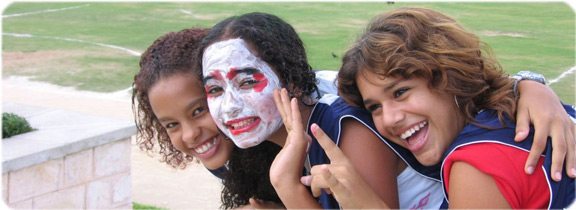
Academy Fellows
With the aim of bringing diverse perspectives and fresh energy to the Aga Khan Academies, a small number of carefully selected recent graduates from well-respected universities are recruited each year to serve as Aga Khan Academy Fellows.
How can I become part of the Academy Fellow's Programme?
To find out more and submit your application, please visit the AKDN Career Centre
Applications are now open for opportunities in Kenya, India and Mozambique for 2021
What is the Fellows Programme at the Aga Khan Academies?
Academy Fellows have the opportunity to work with gifted and talented students from diverse ethnic, religious and socioeconomic backgrounds. Each Academy Fellow will live on campus and serve the student residential programme as a Dorm Parent promoting community life.
Academy Fellows have a demanding and important role in our community and may be responsible for any of the following, depending on the Fellow’s interests and experiences and the Academy’s needs:
- Key role as a Dorm Parent in the residential programme, which includes weekday duties and weekend duties.
- Assistance in a specific curricular area under the mentorship of an experienced master teacher.
- Tutoring individual students or study groups.
- Involvement in the administrative work of departments such as Admissions, Communications or University Counselling.
- Coaching sports and athletic teams, providing music lessons, SAT prep, artistic pursuits.
An integral part of the residential programme at the Academy, the Fellows participate actively in and chaperone off campus field trips, engage in the enrichment programmes (sports, arts, ...) and are closely involved in the student leadership development programme, including activities such as Model MUN, TedX etc.
These opportunities are offered at all our Academy campuses: Mombasa, Kenya, Hyderabad, India and Maputo, Mozambique - Future Academies are planned across Africa, South and Central Asia, and the Middle East.,In which parts of the world can I hope to serve as a Fellow?
Fellows can indicate a preference when applying.
Is this a permanent role or can I come just for a few months or a year?
These will be two-year appointments, overlapping so as to assure continuity. Some Academies will consider one year appointments but prefer a longer commitment.
What are we looking for in our Fellows?
- Genuine interest and commitment to the mission of the Aga Khan Academies and to the development of young people.
- A record of excellent academic achievement at a highly respected college or university.
- A record of significant involvement in residential life, student leadership programming, music, athletic and/or community service during college or university.
The Fellow's programme also provides onsite mentoring and coaching by experienced faculty and staff and an opportunity to experience life in a lively and dynamic school environment.
Some Fellows may come from the AK Academies’ alumni body and others may decide to pursue a career in teaching or education in general.
Do you want to hear more about the programme?
Click here to read what some of our former Fellow have to say about their experience and see them in action.
To find out more and submit your application, please visit the AKDN Career Centre

Clone of Academy Fellows
With the aim of bringing diverse perspectives and fresh energy to the Aga Khan Academies, a small number of carefully selected recent graduates from well-respected universities are recruited each year to serve as Aga Khan Academy Fellows.
How can I become part of the Academy Fellow's Programme?
To find out more and submit your application, please visit the AKDN Career Centre
Applications are now open for opportunities in Kenya, India and Mozambique for 2020
What is the Fellows Programme at the Aga Khan Academies?
Academy Fellows have the opportunity to work with gifted and talented students from diverse ethnic, religious and socioeconomic backgrounds. Each Academy Fellow will live on campus and serve the student residential programme as a Dorm Parent promoting community life.
Academy Fellows have a demanding and important role in our community and may be responsible for any of the following, depending on the Fellow’s interests and experiences and the Academy’s needs:
- Key role as a Dorm Parent in the residential programme, which includes weekday duties and weekend duties.
- Assistance in a specific curricular area under the mentorship of an experienced master teacher.
- Tutoring individual students or study groups.
- Involvement in the administrative work of departments such as Admissions, Communications or University Counselling.
- Coaching sports and athletic teams, providing music lessons, SAT prep, artistic pursuits.
An integral part of the residential programme at the Academy, the Fellows participate actively in and chaperone off campus field trips, engage in the enrichment programmes (sports, arts, ...) and are closely involved in the student leadership development programme, including activities such as Model MUN, TedX etc.
These opportunities are offered at all our Academy campuses: Mombasa, Kenya, Hyderabad, India and Maputo, Mozambique - Future Academies are planned across Africa, South and Central Asia, and the Middle East.,In which parts of the world can I hope to serve as a Fellow?
Fellows can indicate a preference when applying.
Is this a permanent role or can I come just for a few months or a year?
These will be two-year appointments, overlapping so as to assure continuity. Some Academies will consider one year appointments but prefer a longer commitment.
What are we looking for in our Fellows?
- Genuine interest and commitment to the mission of the Aga Khan Academies and to the development of young people.
- A record of excellent academic achievement at a highly respected college or university.
- A record of significant involvement in residential life, student leadership programming, music, athletic and/or community service during college or university.
The Fellow's programme also provides onsite mentoring and coaching by experienced faculty and staff and an opportunity to experience life in a lively and dynamic school environment.
Some Fellows may come from the AK Academies’ alumni body and others may decide to pursue a career in teaching or education in general.
Do you want to hear more about the programme?
Click here to read what some of our former Fellow have to say about their experience and see them in action.
To find out more and submit your application, please visit the AKDN Career Centre
Karim Ismail : Empowering teachers to nurture leaders
Joining the Academy virtually for the new academic year 2020 - 2021, our new Senior School Principal is excited to provide support to our teachers and collaborate with them in order to make as big an impact as possible as a group.
From his university days, Karim Ismail knew he wanted to work with young people and has not looked back since. Grateful for the experiences during his education, he felt compelled to share the love for learning amongst youngsters and recreate those experiences for students around the world.
“Understanding how I could ensure that other students get similar opportunities to build their character and personality made it an easy career decision,” he shared on his choice to become a teacher.
Hailing from the UK, Karim’s journey as a teacher and school leader has taken him all over the world including Kenya, Uganda, India, South Africa and Mozambique to name a few. He was working at an IB institution when he was recruited as one of the founding teachers of the Senior School at the Aga Khan Academy Hyderabad. Having worked for the Academies and other IB institutions in various leadership capacities, Karim now joins the AKA Maputo as the Senior School Principal.
Reflecting back when he held a similar role in Hyderabad, he said there are a number of reasons why it was special for him. “The time spent in Hyderabad not only gave me the opportunities to contribute towards student and teacher development but was developmental for me as a teacher and a leader as well. And I was proud to see through our first cohort of graduates in the Diploma Programme. I have very fond memories of my time in Hyderabad.”
Identifying the impact of education policy and the influence of change at a systemic level, Karim has experience in non-classroom based roles as well. He has worked with many schools in order to build on existing capacities to improve potential and has qualified to train teachers to become IB certified which is something he still does today.
“Taking the opportunity to step out of the classroom and partner with schools to focus on their institutional improvement was eye-opening. I have had the privilege of visiting excellent institutions and seeing their practices in place, and learning on each occasion. Meeting and training IB teachers from all corners of the world allows you to understand those educational contexts and their valuable diversity. Inevitably this work brought me back to working with the Aga Khan Academies.”
In his visits to the AKA Maputo, he has played an important role in understanding how to improve upon the quality of mathematics education, looking at changes in curriculum as well as their implementation. He brings this same analytical eye to the Senior School where he is excited to work full time with his new colleagues in Maputo. Having worked with the teachers in Maputo on various occasions, Karim lauds the teachers at the Academy for their strong set of core values which resonate with him; enabling him to provide support and encourage teachers in their mission to nurture leaders.
“Students have huge potential to become leaders. And our teachers, in my opinion, are the only way we're going to achieve that. They are the key drivers of change. They’re going to influence minds. They're going to be the relationship holders with that student body. And so my role is very much to give the teachers what they need, provide that space and encouragement, be that support and give them resources to allow them to do that job to the best of their capability.”
Praising the Academy for its quick and comprehensive response to the challenges posed by COVID-19, he found the quality of the online programme comparable to some of the best on offer with regards to its points of contact, rich content and technical tools deployed therein. While he agrees that the unique in person contact experience cannot be replicated, the Academy strives to achieve similar outcomes.
“If you have good relationships with your students, you can get the most out of them and they can work with you to identify their barriers, to push through their challenges and go through their good and bad days knowing that they have that support as a constant anchor for them in the classroom, virtual or otherwise.”
But there have also been a few silver linings through this unprecedented time. Karim points out that online learning has allowed students to develop their own skills in terms of organisation, their independence as a learner as well as their self-reliance and grit which will be hugely important moving forward.
Highlighting another boon in the transition to online learning, he finds that it, “facilitates the opportunity to provide intervention and support that cannot always be offered in a physical classroom, and this can lead to a better understanding of students’ needs, and positive impact on their progress.” He adds that this can be applicable to mathematics, language learning and other areas whereby the faculty are equipped to individualise instruction, provide feedback in a more direct way to students and in essence, help them bridge some of their prior gaps and misconceptions in a more efficient way.
Feeling honoured and privileged to be serving in his new role, he said, “I recognise this opportunity to really support the vision of what we're trying to do at the Academy. For our students, it's one of the most unorthodox experiences they have had educationally and in their lives. And I'm heartened and proud of the way in which I've seen people demonstrate grit and perseverance to get through this. That's going to make them stronger people.”
“And as we come back together as a physical school community in the future, I look forward to sharing those experiences, strengthening our Academy community, and appreciating the stimulation and freedom that comes with access to schooling. We have an incredibly exciting journey ahead.”
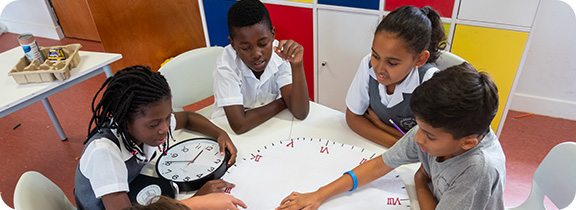
Academic Programme
The Aga Khan Academy Maputo is currently open for Nursery, Junior and Senior School students. We offer an education of an internationally recognised standard of excellence to prepare students to become intellectually curious, global-minded citizens of the world.The Academy programme develops students who are committed to positive change and are able to understand and analyse complex issues of local, national and global significance.
Our curriculum is built on the framework of the International Baccalaureate (IB). The IB is a thorough, multidisciplinary curriculum that fosters:
- intellectual curiosity
- creativity
- leadership development
- social consciousness
- a pluralistic sensibility.
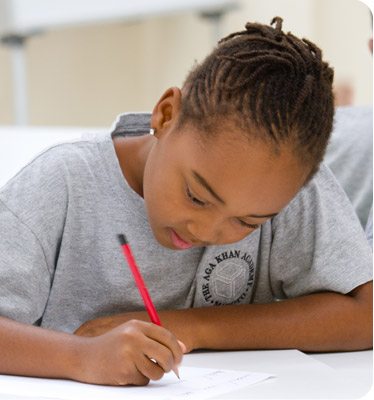
The IB is also known for preparing students for admission to the best universities in their own countries and abroad.
Our focus is on developing students' critical thinking skills and the ability to analyse issues. We also emphasise multicultural understanding and awareness. One of the ways in which we help our students develop skills for ethical leadership is through the Aga Khan Curricular Strands. These are cross-disciplinary areas of study that have been developed for the network of Aga Khan Academies.
Overall educational programme
Our curriculum is complemented by co-curricular, athletic and community service initiatives. The overall educational programme is designed to educate well-rounded, civic-minded individuals. It enhances students’ academic excellence, leadership skills, sense of civic responsibility, understanding of global issues, and analytical and study skills. The programme also reinforces an understanding of local languages, history, cultures and environment.
After completing the full Academy programme, students will be expected to be computer literate and have a thorough understanding of the diverse academic disciplines covered in the IB curriculum. They should have mastered at least two languages, including English. Through the planned international exchange programme, our students will be able to enhance their foreign language learning and appreciation of other cultures.
Our graduates thus will be well prepared for the rigours of higher education and to pursue opportunities in an increasingly interdependent world.
For further information on the programme currently being offered at the Aga Khan Academy Maputo, please visit the Primary Years Programme and Middle Years Programme pages.
Register for assessments
The Aga Khan Academy Mombasa, a programme of the Aga Khan Development, is the first in a global network of 18 planned Academies.
We select a diverse group of students with exceptional academic and leadership potential, offering financial assistance where needed. We offer them a world-class International Baccalaureate (IB) education on a residential campus with outstanding facilities, preparing them to make a positive contribution to society.
Through our inquiry-based approach to learning, students develop independent and collaborative learning skills, problem-solving and critical thinking. We also ensure that students develop their gifts and talents through a wide range of sports, arts and cultural activities, nurturing the holistic development of each child. Our teachers are highly qualified, experienced and committed to their ongoing professional development.
